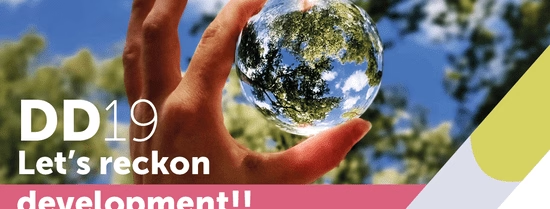The field of development studies is not estranged from critiques of extractive and hegemonizing policies and practices – the power relations that reproduce structural inequalities around the world.
In the age of environmental crises, unprecedented migration and displacement, and questions around justice and equity, we believe that development research and praxis are undergoing a moment of reckoning as scholars and practitioners grapple with the limitations and shortcomings of dominant approaches to development.
The theme of DD19 speaks to the ongoing pertinent issues of the regime we currently live in, where ‘development’ is impacted by past mistakes as well as impacts contemporary attempts for justice.
Climate change, war, human rights violations, unequal resource distribution, and discrimination based on gender, sexuality, caste, class, race, nationality, religion, and numerous other dimensions that characterize our identities - who we are - are all part of the discussion. People are negatively and unevenly affected by these dimensions in each periphery of the world, with the most marginalized groups suffering the most. These inequalities have only been accentuated and made worse by the COVID-19 outbreak, which demonstrated the reflexive way specific discourses continue to dominate and define contemporary approaches to research and praxis.
Western development’s reliance on technocratic models and top-down perspectives ... has created a regime of incomprehensive development understanding.'
The embedded reliance on traditional development discourses in producing knowledge, data, and policies over the years continues to generate questions and reflections on modalities and constraints such discourses impose/promote. Western development’s constant reliance on technocratic models and top-down perspectives, emphasizing economic growth and modernization, has created a regime of incomprehensive development understanding.
Activism and scholarship from Brown and Black peoples enduring erasure and violences at the hands of these models demonstrate how compliance with such models and thinking perpetuates existing power imbalances, and further neglects the perspectives, knowledge, needs of marginalized groups/ communities. These sustained harms exacerbate historic and contemporary violences and injustice.
Calling for a new reckoning
Calling for the reckoning is not new, but a longstanding demand from communities around the world who work to decolonize development by rethinking traditional development indicators and metrics and incorporating participatory and inclusive approaches that prioritize local knowledges and perspectives, social and environmental sustainability, to focus on shifting power dynamics so plural and diverse world(s) can exist together.
Thus, the idea of reckoning employed here is part of ongoing efforts of solidarity with these scholars and peoples’ work, particularly from the Global South, to decolonize the academy and the fundamental racist, sexist, and classist institutions and systems that perpetuate violent realities.
We find it relevant for this DD to bring attention to the debate in the academic/practitioner context in this moment and foster a space for us to talk to each other about our intersecting work, reflections, and plans for potential futures.
[Recognizing] ... the need to address systemic issues of power and privilege within the field of development research
In doing so we embrace the ongoing reckoning as a recognition of the need to address systemic issues of power and privilege within the field of development research and its resultant practices. This includes a critique of the dominance of western epistemologies and a call for greater diversity, representation and inclusion of the Global South within academic and professional circles.
Development Dialogues’ recognition of this reckoning within development research and practice represents a critical juncture in the field's evolution. The conference urges scholars and practitioners to grapple with the complex challenges of promoting social justice and sustainability in an increasingly interconnected and unequal world, and to acknowledge that the majority of social, political, economic, and environmental crises are the outcomes of old development models that need to be transformed.
This conference is our opportunity to address these shortcomings and add our scholarship to the reckoning.
Sub-themes *
- Global north-south relations: reckoning with power imbalances and building more equitable partnerships
- Co-creation and co-design for development: fostering inclusive and collaborative development approaches
- Rethinking evaluation: past and future of how we measure development outcomes
- Approaches to reckoning and healing: including the role of indigenous knowledge and traditions
- Gender and sexuality in development research & practice: reclaiming our bodies and shaping our identities
- Challenging growth-oriented development: examining the limits of growth and the need for alternatives
- Environmental justice: examining the intersection of environmental degradation, climate change, and development, and exploring strategies for promoting environmental justice and sustainability
- Development and mobility, rethinking the tie: reckoning development effects in people on the move, displacement and (im)mobilities of things and people.
These sub-topics provide a range of areas of development that can be explored through the lens of reckoning with the past and imagining just and equitable worlds.
They offer opportunities for conference participants to engage with a variety of development issues related to specific areas of work and expertise. Participants are invited to apply by choosing one of these sub-topics, but they might be moved to a different topic depending on the overview of applications. Participants can also suggest if they prefer to be in a stand-alone presentation or in a panel discussion with other participants, however this will be decided at the end depending on the overview of topics and applications.
* These themes are intentionally broad in order to facilitate greater engagement with scholars/activists/artists of varying disciplines and practitioners from different fields. For example: several topics can fit within sub-theme one, this is done with intent, as this meeting is not for encountering those with the same ideas or topics as your own, but to foster dialogue across disciplines. Therefore, we encourage applicants to submit abstracts to sub-themes they believe would garner important conversations.
DD19 is partly funded by EADI, the European Association of Development Research and Training Institutes
